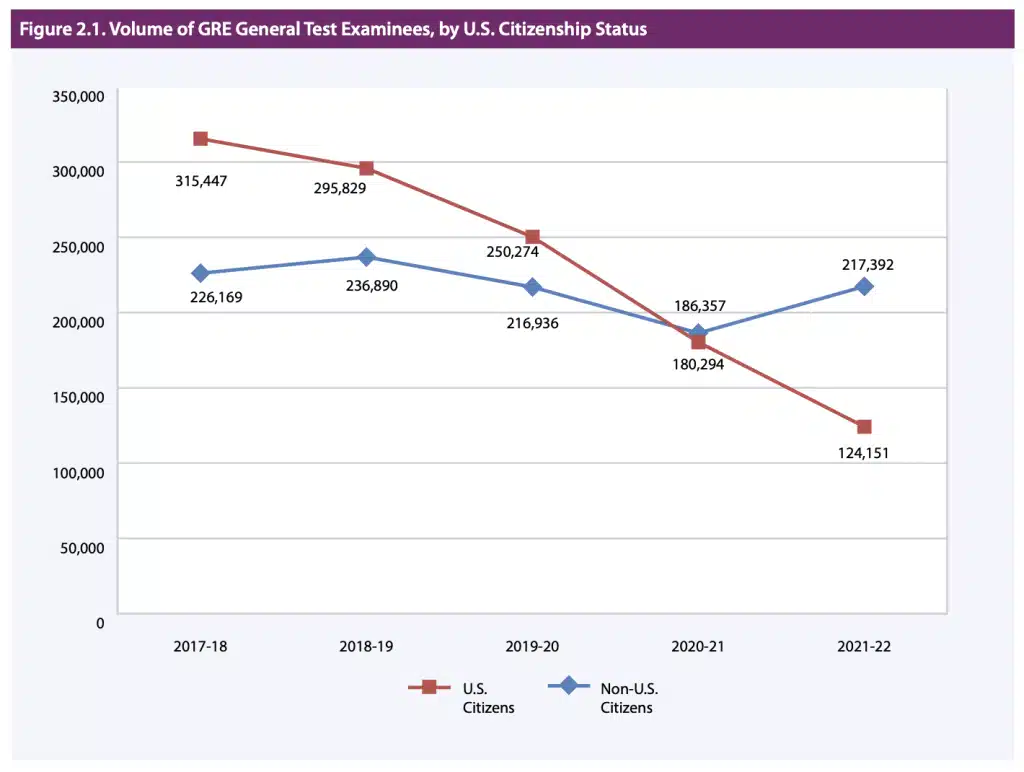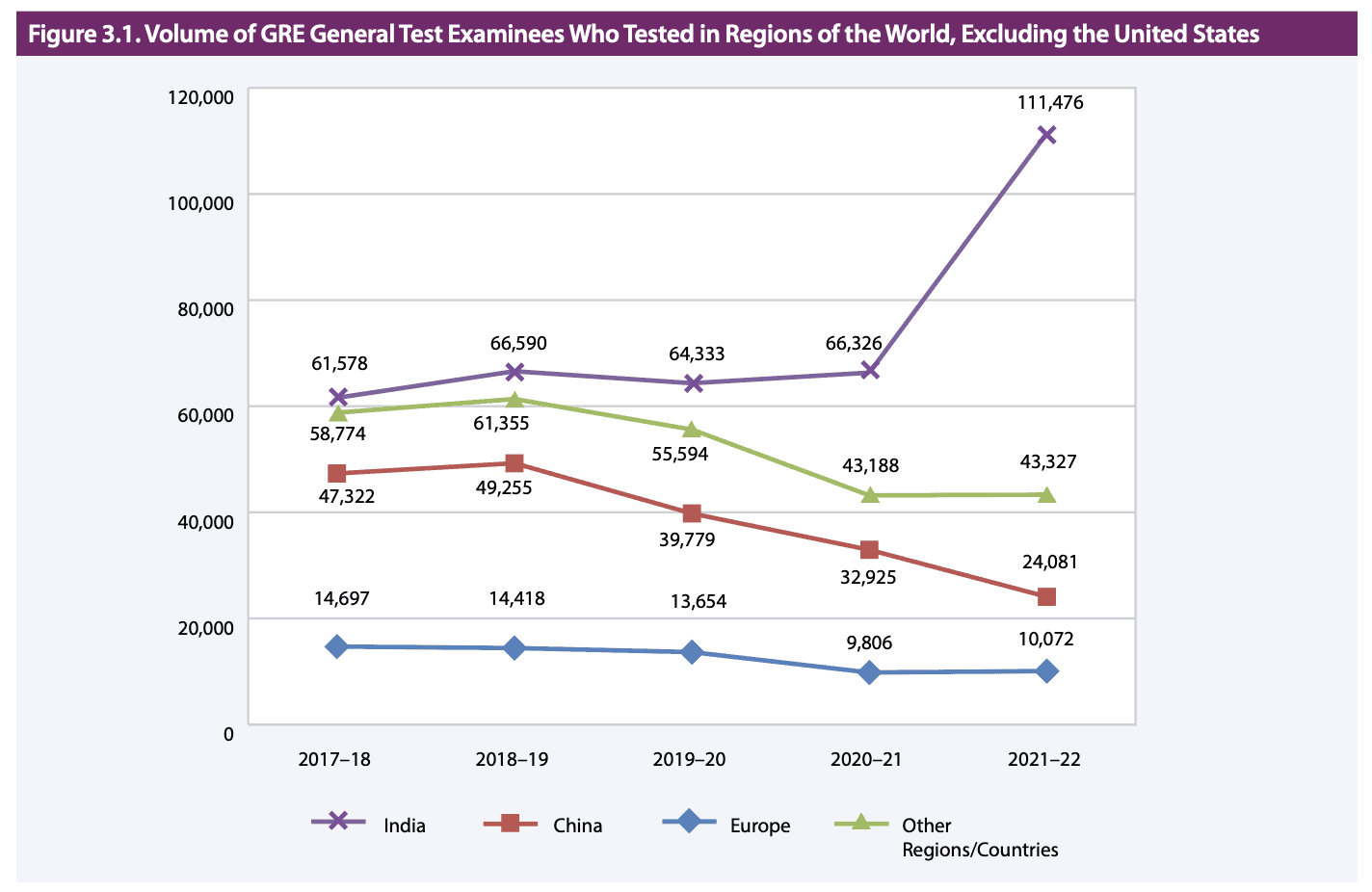The Shorter GRE: What to Expect & How to Be Ready for the New Shorter GRE Exam Pattern

Earlier this year, the SAT switched to the Digital SAT, and starting this July, the TOEFL exam will also change and become shorter. In addition, the new GMAT Focus exam, the changed version of the current GMAT exam, will be introduced by the last quarter of this year. And now, starting from 22 September this year, the GRE is joining the lineup of changes. Indeed, the Standardized Testing Universe continues to experience the 2023 churn!
So, what are the changes implemented in the upcoming GRE?
Before delving into the changes and their implications, let’s briefly look at the structure and history of the Graduate Record Examination (GRE)
The Graduate Record Examination (GRE)
The GRE (Graduate Record Examination) is a standardized test widely accepted by graduate schools and business schools around the world as part of the admissions process. It is taken by prospective graduate students from various disciplines, including the sciences, humanities, social sciences, and business. The GRE assesses skills such as verbal reasoning, quantitative reasoning, and analytical writing, which are crucial for success in higher education. Achieving a strong GRE score helps applicants demonstrate their academic potential and increases their chances of securing admission to their desired programs.
The GRE was created by ETS in 1949 and has since undergone several changes to adapt to the evolving needs of learners and educational systems. The most significant change occurred in 2011 when the scoring scale shifted from 200-800 to 130-170 for both the verbal and quantitative sections, and the test became section adaptive. The GRE is a section adaptive test, meaning the difficulty of the second sub-section of both the Verbal and the Quantitative Sections depends on the test taker’s performance in the first section. Scoring takes into account the number of correct answers and the difficulty level across both sections.
As reported in the document published by the ETS titled “A Snapshot of the Individuals who took the GRE General Test (July 2017-June 2022),” a total of 341,754 candidates took the GRE in the period between July 2021-June 2022 period, achieving a mean Verbal Reasoning score of 151.3 and a mean Quantitative Reasoning score of 157 out of 170.
New GRE Exam Pattern – Upcoming Changes
The test will become SHORTER !
From 3 hours and 45 minutes, the testing time has been reduced to 1 hour and 58 minutes.
The ETS have reduced the time by doing the following three things:
- Removing one of the two essays – ETS has removed the “Analyze an Argument” task.
- Reducing the number of questions from the Verbal and Quantitative Reasoning sections – From 40 questions in each section, there will now be 27 questions in each of the verbal and quantitative sections. However, there will still be two sub-sections in both Verbal and Quantitative Sections. The number of questions in each sub-section has not yet been decided.
- Removing the unscored experimental section – The new Shorter GRE won’t have any experimental section.
In the shorter GRE, ETS has removed the scheduled 10-minute break that exists in the current format and has reduced the time it takes for a test-taker to receive their Official GRE Score within 8-10 days from 15-20 days that currently exist.
To register for the test, a candidate simply needs to choose a date on or after September 22, 2023. The fees for the GRE, as well as the retake policy for the test, shall remain unchanged. A student shall be able to access the Official mock for the Shorter GRE from the month of September.
The following changes in the number of questions and duration will be implemented in the New Shorter GRE Test Pattern:
| Components | Current GRE Test Pattern | New GRE Test Pattern |
|---|---|---|
| Analytical Writing | 2 essay tasks, 60 mins | 1 essay task, 30 mins |
| Quantitative Reasoning | 40 questions, 60 mins | 27 questions, 47 mins |
| Verbal Reasoning | 40 questions, 70 mins | 27 questions, 41 mins |
| Unscored section | Varies | No Unscored Section |
| Scheduled break* | 10 mins | No Scheduled Break |
| Total | 3 hours, 45 mins | 1 hour, 58 mins |
It’s important to note, though, that the scoring, difficulty level of the questions, the section adaptive nature of the test, as well as the time allotted per question, will remain unchanged.
Implications for aspiring GRE Test takers: What do these changes mean for the students?
Even while taking the mocks, students have often complained about the length of the GRE exam. We have seen how the test day exhaustion would often get the better of even a well-prepared student.
For example, if a student has an 80% accuracy in Reading Comprehension questions of medium difficulty level during the practice sessions, their accuracy often falls by more than 10%-15% during the mocks. In that sense, a shorter GRE would definitely be a better reflection of a student’s potential.
This point has also been highlighted by Amit Sevak, President and CEO of ETS, as reported in the Times of India on Jun 1: “We want test takers to have a good experience with the GRE test. In September, in roughly half the time, test takers will have a better experience that values their time and reduces anxiety and fatigue. Not only are we introducing a better experience for test takers, we’re retaining the strong validity and reliability schools need for confident decision-making.”
Preparation Strategy: How to get ready for the New GRE Exam?
As mentioned earlier, there won’t be any difference in the exam when it comes to question types or syllabus in either the Verbal or the Quantitative Reasoning sections. Even the time allotted per question will almost remain the same. Hence, in terms of preparation, a student should continue to follow the strategy they are using to prepare for the current format of GRE Test.
However, it is important to remember that each question would carry more score in the upcoming Shorter GRE than it carries now and hence the margin for error would also shrink.
Changes in GRE – what do the changes imply?
Like many other Standardized Tests, the GRE has also seen a falling number of tests, and the change has been most prominent in the United States itself. After Covid-19 hit the world, several schools went test optional, giving students the option to either send or not send their Standardized test scores. Several experts believed that the test optional requirement was temporary. Even though some schools have indeed gone back to making the submission of standardized scores mandatory for the upcoming session, several other schools have switched to a Permanent Test Optional policy. This has resulted in a falling number of test takers, as evident in the graph below published in the document published by the ETS titled: “A Snapshot of the Individuals who took the GRE General Test (July 2017-June 2022).”
It’s important to note, however, that even though the fall in the number of test-takers has been consistent among US citizens, there has been an uptick noticed among test-takers who aren’t US citizens. And the uptick, as shown in the other graph, is almost entirely attributable to Indian students who took the test from India. Whether it’s an aberration resulting from a Covid-induced pent-up demand or a more sustained phenomenon remains to be seen. If this trend continues in the coming years as well, then we might see ETS targeting itself further to cater to test-takers from India.
The shorter GRE has indeed been a welcome change for candidates aspiring to take the exam, and its changes are in line with the trends observed across various standardized tests. Making the test shorter would definitely make it more attractive to candidates planning to apply for graduate studies all across the world. While the GRE caters to a broad spectrum of graduate programs, business school aspirants will have the option to choose between two standardized tests: the shorter GRE and the upcoming GMAT Focus exam. The changes in the GMAT Focus are far more extensive compared to the changes in the GRE. However, both tests are trying to adapt to meet the evolving needs of the students and institutions.
Get the best GRE coaching in Kolkata at EduAims. We offer comprehensive coaching and personalized guidance to help you excel in your GRE exams. Join us to get the best guidance for the GRE and achieve your dream score.



